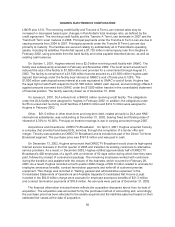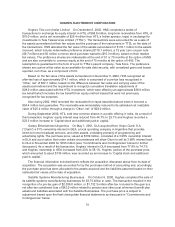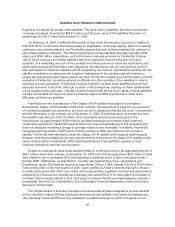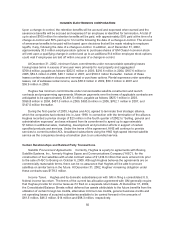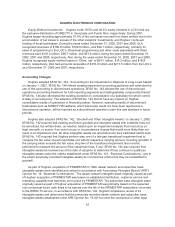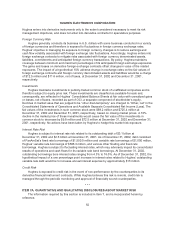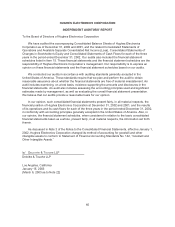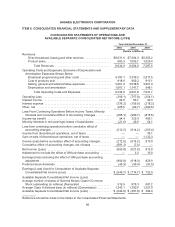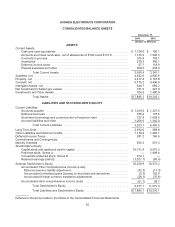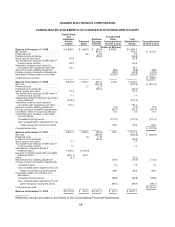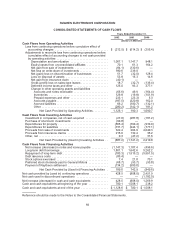DIRECTV 2002 Annual Report Download - page 70
Download and view the complete annual report
Please find page 70 of the 2002 DIRECTV annual report below. You can navigate through the pages in the report by either clicking on the pages listed below, or by using the keyword search tool below to find specific information within the annual report.HUGHES ELECTRONICS CORPORATION
stock-based compensation for all stock-based compensation granted after December 31, 2002 in
accordance with the original transition provisions of SFAS No. 123. Adoption of this standard will result
in an increase in compensation cost recognized in operating results. Had Hughes followed the fair
value based method of accounting for stock-based compensation under SFAS No. 123 for the years
ended December 31, 2002, 2001 and 2000, pro forma earnings (loss) used for computation of
available separate consolidated net income (loss) would have been $(1,112.4) million, $(946.5) million
and $585.3 million, respectively.
In November 2002, the EITF reached a consensus on Issue No. 00-21, “Accounting for Revenue
Arrangements with Multiple Deliverables.” EITF Issue No. 00-21 addresses determination of whether
an arrangement involving more than one deliverable contains more than one unit of accounting and
how the related revenues should be measured and allocated to the separate units of accounting. EITF
Issue No. 00-21 will apply to revenue arrangements entered into after June 30, 2003; however, upon
adoption, the EITF allows the guidance to be applied on a retroactive basis, with the change, if any,
reported as a cumulative effect of accounting change in the consolidated statements of operations.
Hughes has not yet determined the impact this issue will have on its consolidated results of operations
or financial position, if any.
In June 2002, the FASB issued SFAS No. 146, “Accounting for Costs Associated with Exit or
Disposal Activities.” SFAS No. 146 generally requires the recognition of costs associated with exit or
disposal activities when incurred rather than at the date of a commitment to an exit or disposal plan.
SFAS No. 146 replaces previous accounting guidance provided by EITF Issue No. 94-3, “Liability
Recognition for Certain Employee Termination Benefits and Other Costs to Exit an Activity (including
Certain Costs Incurred in a Restructuring).” Hughes is required to implement SFAS No. 146 on
January 1, 2003. Hughes’ adoption of this standard on January 1, 2003 is not expected to have a
significant impact on Hughes’ consolidated results of operations or financial position.
In April 2002, the FASB issued SFAS No. 145, “Rescission of FASB Statements No. 4, 44 and 64,
Amendment of FASB Statement No. 13 and Technical Corrections.” SFAS No. 145 eliminates the
requirement to present gains and losses on the early extinguishment of debt as an extraordinary item,
and resolves accounting inconsistencies for certain lease modifications. Hughes’ adoption of this
standard on January 1, 2003 is not expected to have an impact on Hughes’ consolidated results of
operations or financial position.
Security Ratings
Debt ratings by the various rating agencies reflect each agency’s opinion of the ability of issuers to
repay debt obligations as they come due. Ratings below Baa3 and BBB- denote sub-investment grade
status for Moody’s and S&P, respectively. Ratings in the Ba/BB range generally indicate moderate
protection of interest and principal payments, potentially outweighed by exposure to uncertainties or
adverse conditions. Ratings in the B range generally indicate that the obligor currently has financial
capacity to meet its financial commitments but there is limited assurance over any long period of time
that interest and principal payments will be made or that other terms will be maintained. In general,
lower ratings result in higher borrowing costs. A security rating is not a recommendation to buy, sell, or
hold securities and may be subject to revision or withdrawal at any time by the assigning rating
organization.
Hughes
On December 11, 2002, Moody’s Investor Services (“Moody’s”) confirmed Hughes’ Ba3 senior
secured and senior implied rating. The rating outlook, which previously remained on review for possible
60


